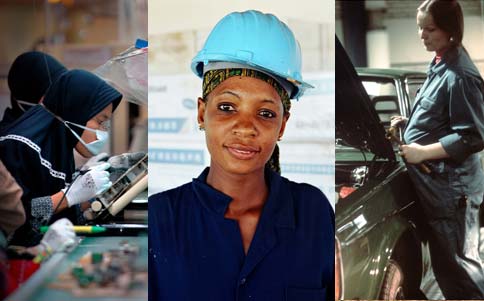Gender Equality and Trade Policy
Gender Equality and Trade Policy
 Including gender perspectives in trade policy and related agreements is an essential element of an integrated development policy framework which combines social and economic measures to ensure fairer and beneficial outcomes for all. Trade can have strong and varying effects on the overall wellbeing of different groups of economic actors, including women, who require adequate and specific policy responses.
Including gender perspectives in trade policy and related agreements is an essential element of an integrated development policy framework which combines social and economic measures to ensure fairer and beneficial outcomes for all. Trade can have strong and varying effects on the overall wellbeing of different groups of economic actors, including women, who require adequate and specific policy responses.
While trade policies need to become gender-responsive, other measures not directly related to trade are also necessary if both women and men – and the economy as a whole – are to reap the full benefits of trade expansion. These include Access to Education, employment, fiscal and social policies, and, above all, policies that enhance productive capacities. Women’s education and continuing skills acquisition are likely to be the most important factors determining the impact of trade on women’s economic opportunities and on reducing the gender wage gap. As long as women remain less qualified than men, they are likely to remain in lower paying, less secure jobs, even if better-paying jobs become available through trade expansion. Improving women’s access to education, technology and skills, on the other hand, implies a change in attitudes and in socio-cultural norms, as well as a more equitable distribution of household chores between men and women; moreover, it cannot happen without addressing the “time poverty” issue.
Two common shortcomings should be avoided when mainstreaming gender in trade policy:
- First, – the “adding-on” shortcoming – consists of making gender considerations an after-thought; in other words, gender-differentiated impacts of trade policy and trade agreements are evaluated once the most crucial phases of trade policy formulation and negotiation are already completed.
- The second – the “evaporation” shortcoming – consists of discussing and assessing gender-related issues during trade policy formulation and negotiations but failing to include concrete measures in the core of trade agreements and trade laws.UNCTAD. Resource Paper on Gender Equality and Trade Policy.
Available at: http://www.un.org/womenwatch/feature/trade/gender_equality_and_trade_policy.pdf
New online feature on Gender Equality and Trade Policy – by Womenwatch
The is available at online feature and presents the collective views of the UN system on the links between gender equality and trade policy. The feature provides a summary overview of key questions, concerns and policy recommendations while providing reference to related UN resolutions, UN official documentation, publications and websites. The feature contains the following sections:
- Section II briefly reviews the evolution of the international debate on globalization, trade liberalization and their impacts on equitable development, in the context of the United Nations Development agenda as the overarching framework for development.
- Section III dwells upon the relevance of integrating – or mainstreaming – gender perspectives in trade policy and discusses the implications of women’s economic Gender, Institutions and Development Data Base Variables: Political Empowerment on trade and economic growth.
- Section IV analyzes, through a gender lens, some commonly observed impacts of international trade on labor markets and small businesses.
- Section V addresses the potential of labor mobility as a tool for women’s empowerment in the context of international migration and international trade in services.
- Section VI further explains the interrelationships between trade policy and gender equality in Women and Agriculture.
- Section VII reflects upon the impact of the financial and economic crisis on women and presents data and examples of policies implemented by governments to address it.
- Section VIII reviews good practices in incorporating gender considerations in trade policy and trade agreements.
- Finally, Section IX presents a non-exhaustive list of actions undertaken by the UN system to support the process of making trade policy more responsive to the specific needs of women and instrumental to gender equality and women’s empowerment.
- The Annex includes UN Resolutions, UN official documents, publications and websites on the issues addressed in the special feature.
The special feature is an output of the Inter-agency Network on Women and Gender Equality (IANGWE). UNCTAD – as manager of the IANWGE Task Force on Gender and Trade – led and coordinated the initiative, with support from UN Women as IANWGE task manager of Womenwatch.
See also
- United Nations Women Watch
- Gender Equality and Decent Work
- Gender and Trade Initiative (GATI)
- Capacity building program on Gender and Trade Unions
References


